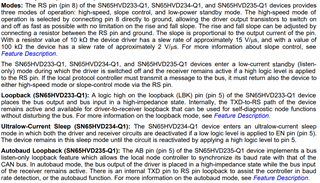Hello Guys,
Good day.
What is the operating supply current for SN65HVD233-Q1?
I am seeing Dominant and Recessive Supply Current. May I know the difference between the two?
Thanks and regards,
Ariel
This thread has been locked.
If you have a related question, please click the "Ask a related question" button in the top right corner. The newly created question will be automatically linked to this question.
Hello Guys,
Good day.
What is the operating supply current for SN65HVD233-Q1?
I am seeing Dominant and Recessive Supply Current. May I know the difference between the two?
Thanks and regards,
Ariel
Hi Ariel,
I am going to reference this table below:

This device has three modes that it can operate in, sleep mode, standby mode, and normal mode. If you would like more clarification on how this device enters these modes let me know.
In these different modes the driver and receiver of the device are in different states:

The dominant and recessive current is the current that the device uses in normal mode. All CAN devices when they are transmitting a signal can either transmit a recessive (high) or a dominant (low) signal. For most devices they actually use more current driving the bus dominant. However, for this device it uses the same current when sending a recessive or dominant signal.
Let me know if you have any more questions.
Best,
Chris
Hi Ariel,
Keep in mind that the listed current draw is for a no-load case on the bus. When there is a resistive load between CANH and CANL, the transceiver will supply current to the load in order to create a voltage differential between the bus pins to drive a dominant signal. In a typical system with 60-ohms of termination resistance, the transceiver will drive a 2.0V differential and thus draw an additional ~28mA from Icc.
Note that this is only the case in the dominant state as the driver is passive (weak bias to 2.3V) while in a recessive state. This means that the average consumption of the transceiver will depend on how often it is driving the bus and the contents of the data it is driving (more 0, more dominant, more current).
Regards,
Eric Schott